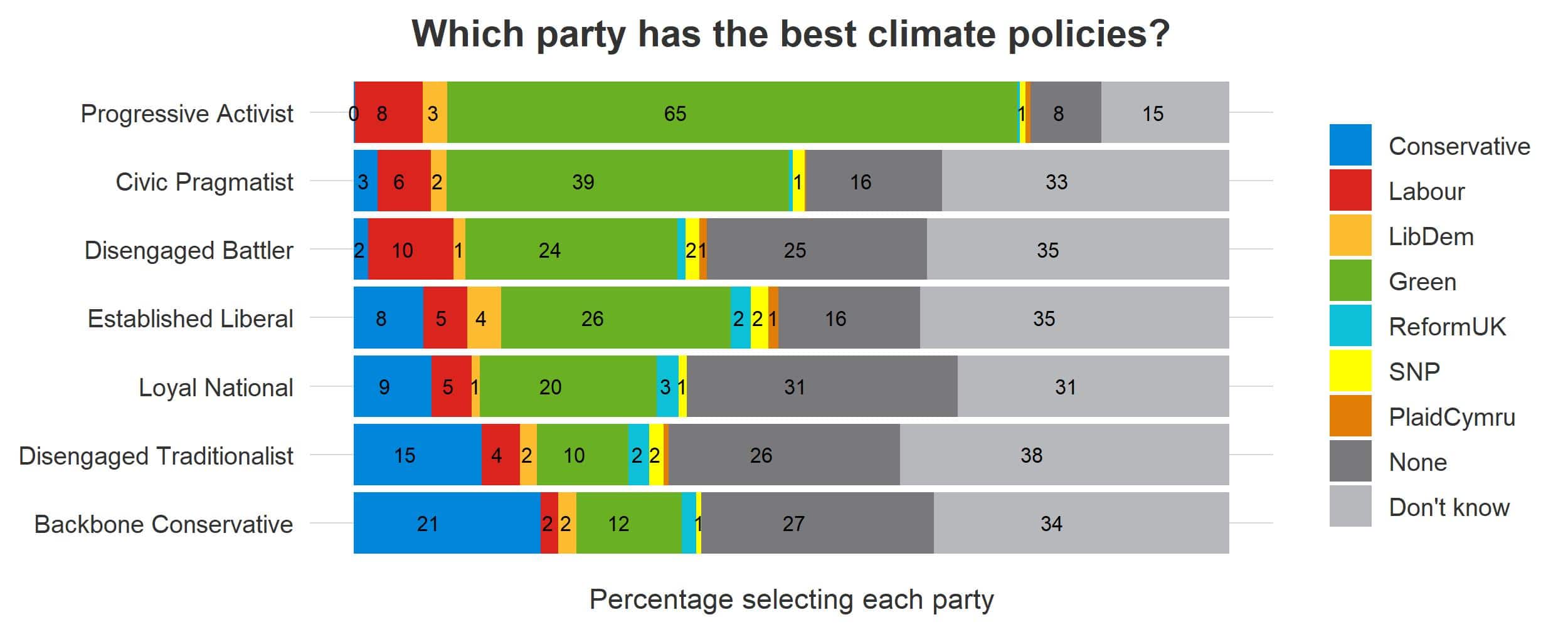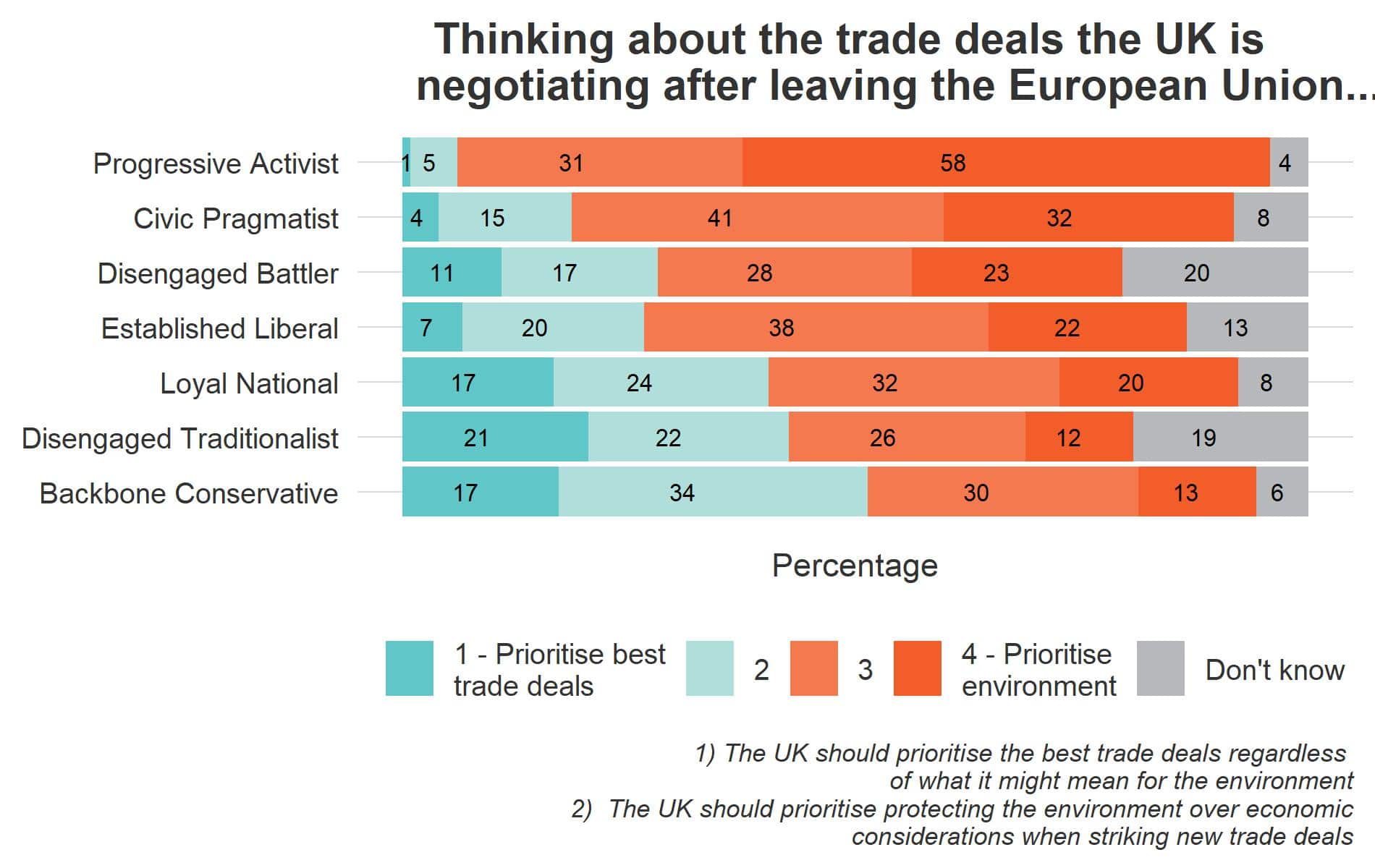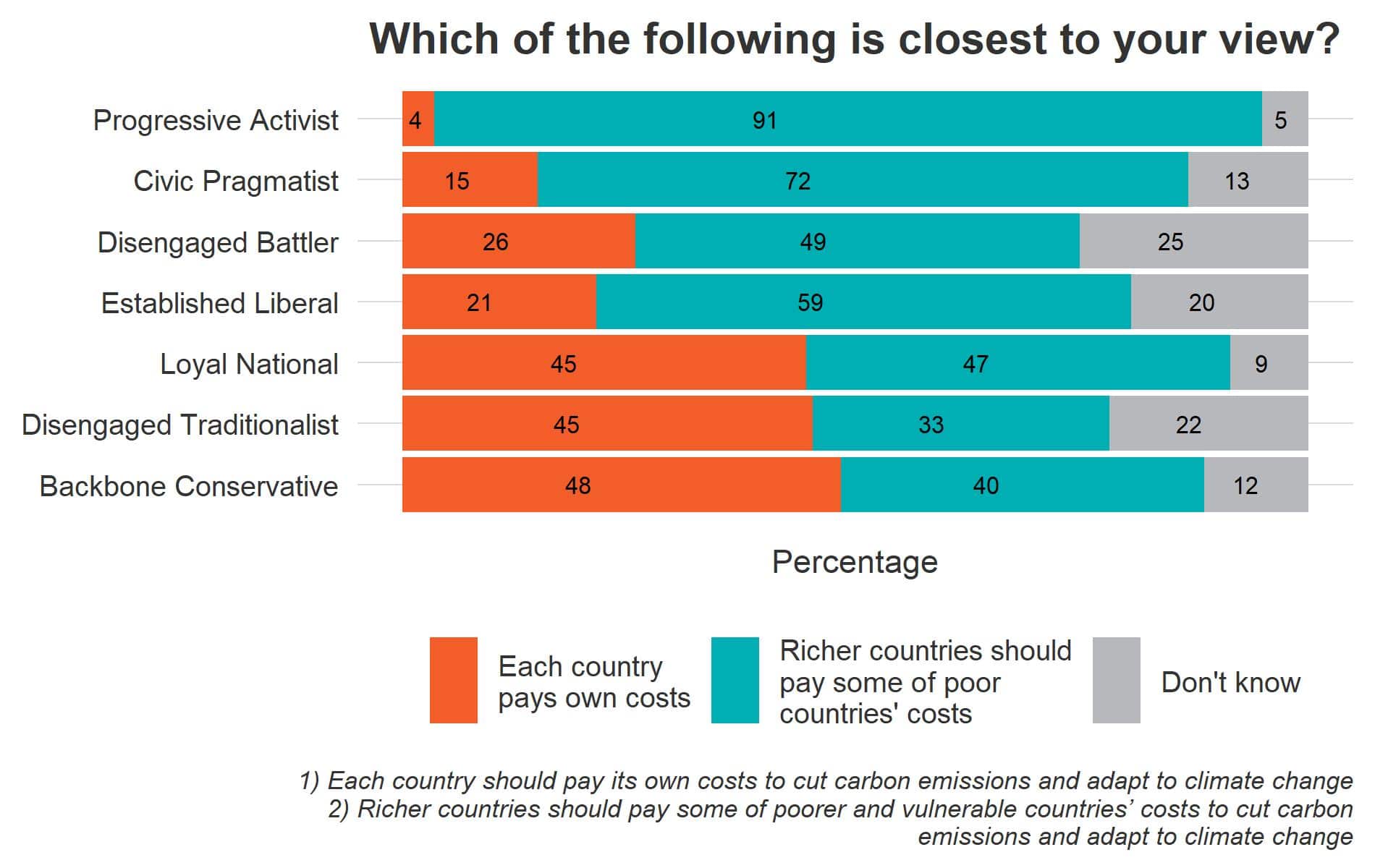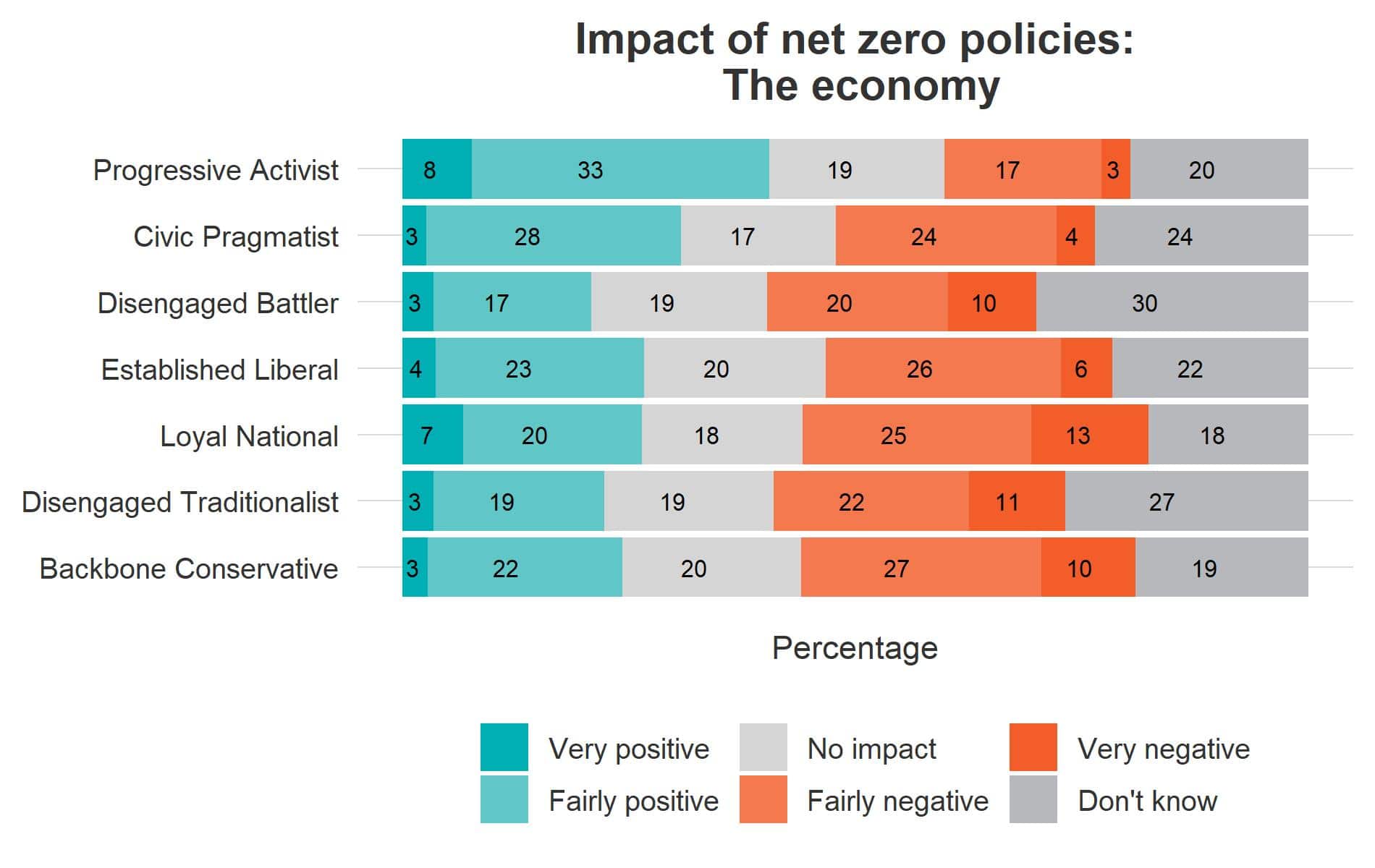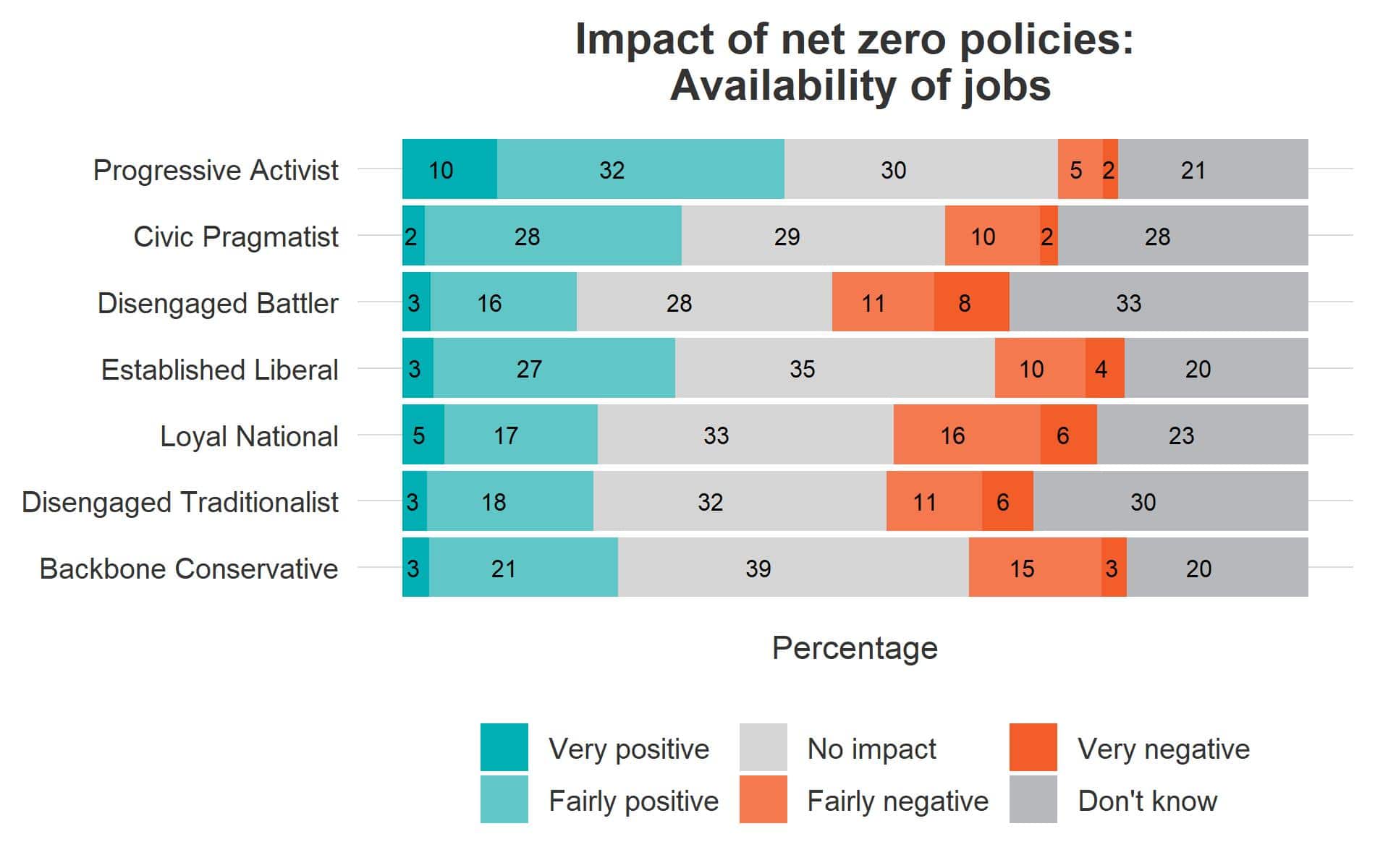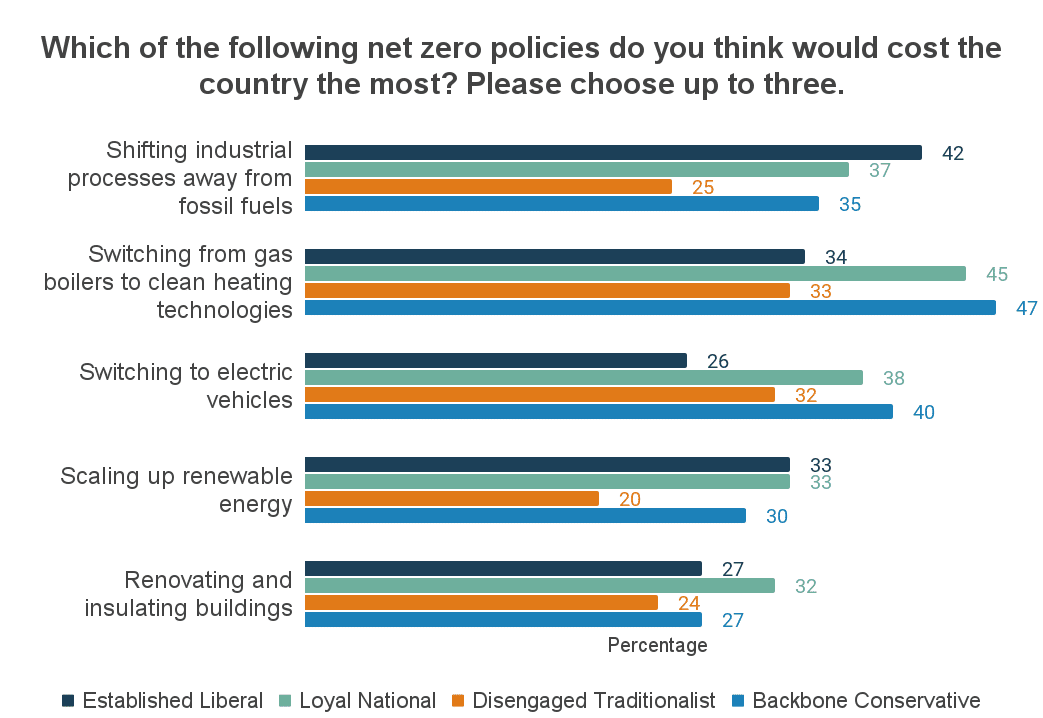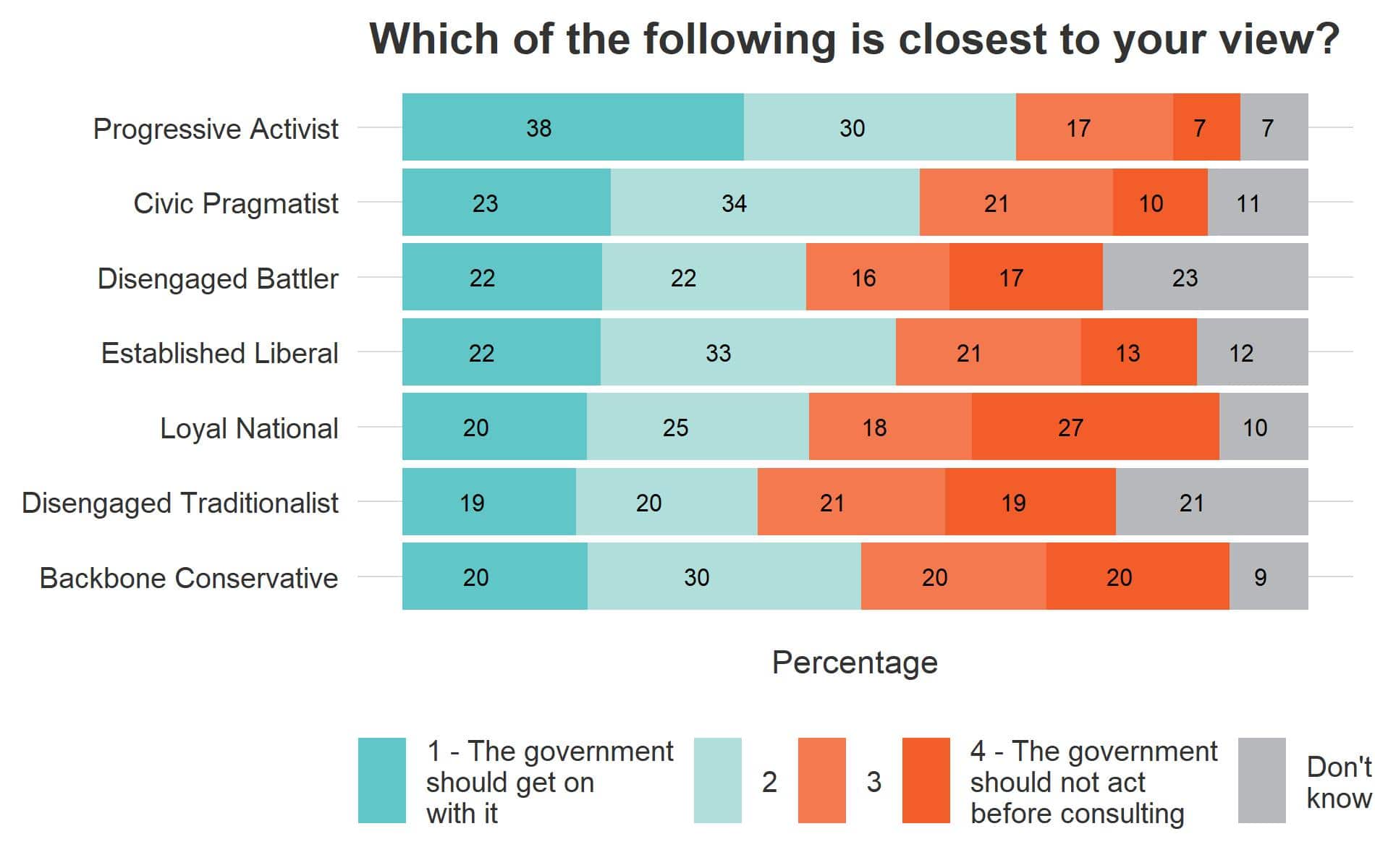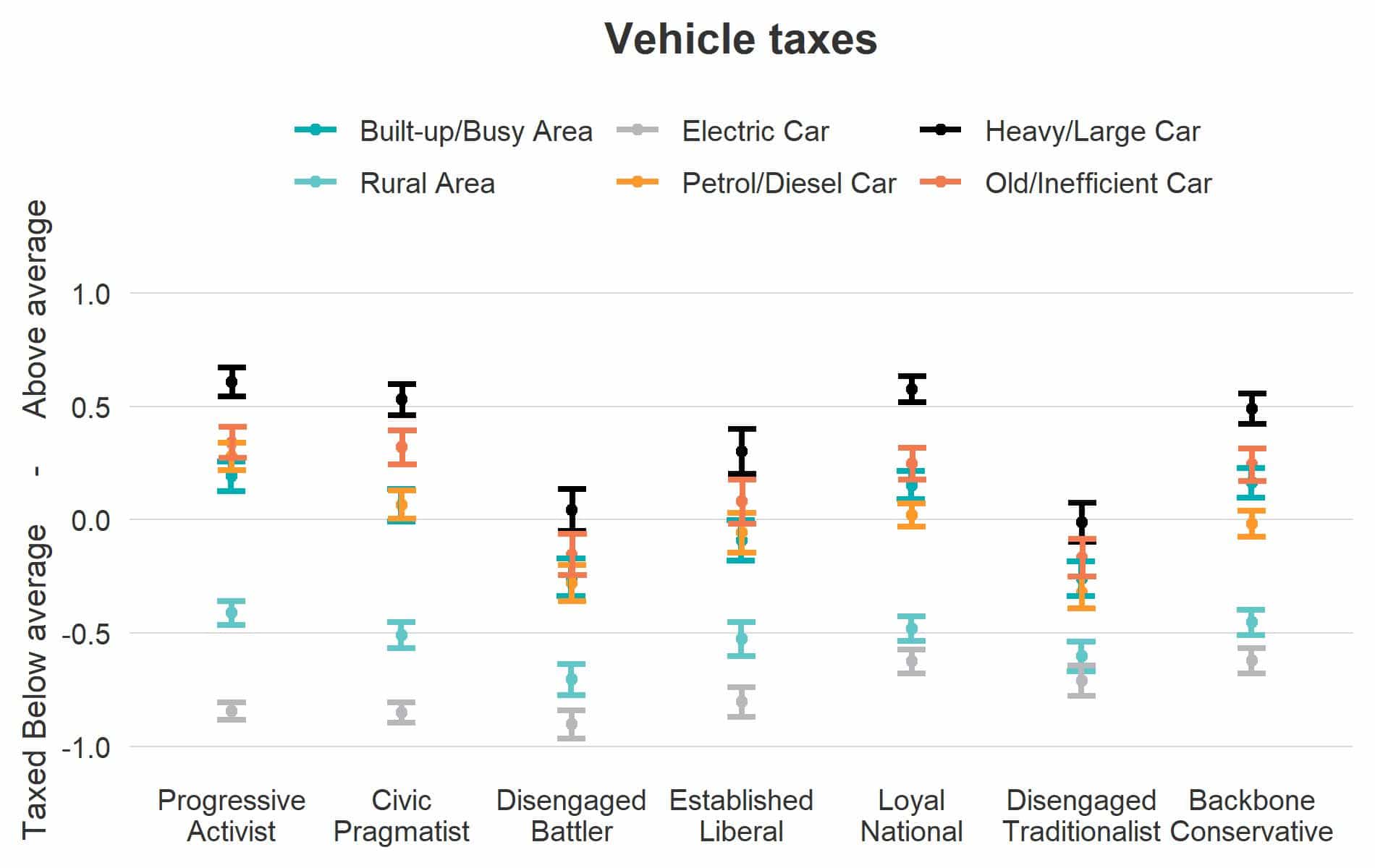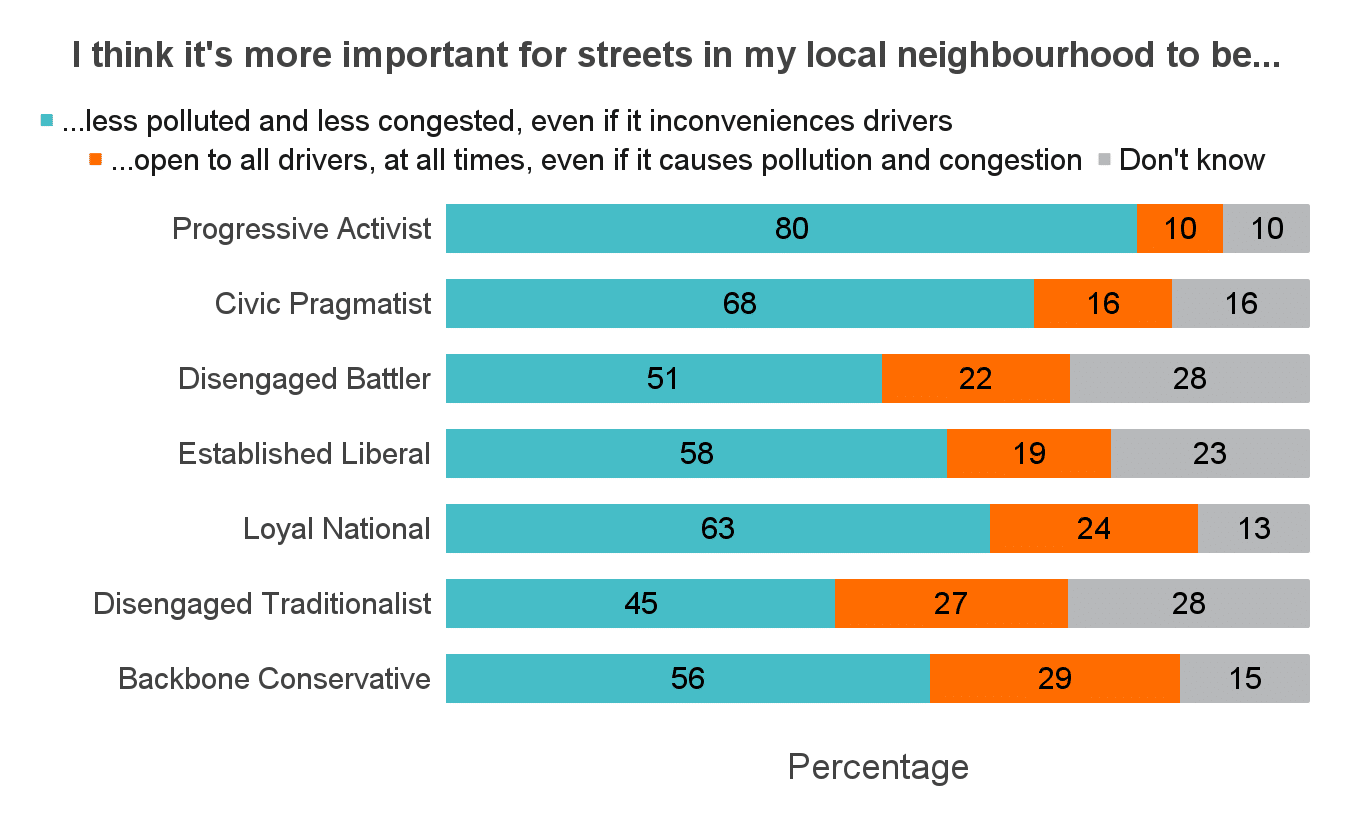Net zero, fairness and climate politics
Public concern about climate change is high and broad-based but it exists at a time of great change, uncertainty and cynicism. As the country continues to endure waves of sickness, alongside rising costs of living, difficult political conversations are beginning to play out about what fair net zero policies look like and how to pay for them. This research seeks to answer critical questions about how people prioritise climate change compared to other important issues; how they relate fairness to climate change and climate policy; how they perceive net zero and the potential benefits and costs; and how they think action on climate might affect the UK’s place in the world.
The UK public (through events such as the Climate Assembly UK) have made clear their belief that climate action should be fair for all. However, there are key differences between people from the seven British segments (based on More in Common’s Core Beliefs model) when it comes to their understanding of net zero, and what they think is “fair” and “unfair.”
Between January and April 2022, we conducted a research project mapping how people across the seven values-based segments of the British population feel about net zero and what underpins their views on fairness. We included all segments in our survey data but, due to the topic, in focus groups we focused particularly on four segments with political leanings ranging from right to centre. The following pages therefore include analysis and quotes from Established Liberals, Loyal Nationals, Disengaged Traditionalists and Backbone Conservatives. Find out more about this project by watching the accompanying webinar, viewing the slide deck or reading more on updated sections of the web toolkit. All tables and figures show Climate Outreach analysis of YouGov data.
Watch the launch webinar for this new research and download the slides below.
Do's and don'ts for communicating net zero and fairness
DO talk about “doing your bit”
All segments of Britain show some openness to changing their behaviour in an effort to cut carbon emissions. For example, around half of Britons are willing to reduce their meat consumption to some extent (on top of those who are vegetarian or vegan). A majority in every segment are willing to pay a flight tax on their second or third flight in a year.
Previous research highlights the universal power of “doing your bit.” Majorities in all segments say that “doing their bit to protect the environment” makes them feel proud.
Messages should prioritise recognition and positive reinforcement of what people are already doing to reduce their impact on the environment (e.g. recycling, reducing meat consumption).
Communicators can build on this sense of pride by framing net zero policies and behaviour change as an extension and enabler of people “doing their bit.
DON’T ignore differences in means and motivations
“Doing your bit” looks different depending on your means and motivations. People from low-income households may not be able to afford climate friendly technologies, such as electric cars. Low income households are likely to have relatively small carbon footprints anyway, and communication to these groups should recognise that. This is most likely to be the case for people in the Loyal Nationals, Disengaged Traditionalists and Disengaged Battlers segments.
People from those segments who are less motivated to take personal steps for the sake of the climate (Disengaged Traditionalists and Backbone Conservatives) may nonetheless want to live a low-carbon lifestyle for non-environmental reasons.
Communications aimed at people from the Disengaged Traditionalist and Backbone Conservative segments should focus on how net zero policies and behaviours will improve energy efficiency and reduce waste.
DO invoke fairness, with care
People agreed that “being asked to do more than your share” is unfair. What this means is that people feel it is fairer for the rich to pay more for net zero than the poor. People also believe that it is fairer for the poor to receive government grants than the rich.
Communications should acknowledge that everyone wants to do their bit to protect the environment, and that some are in a better position to reduce their carbon footprint than others.
DON’T assume that fairness means the same thing to all
Talking about fairness tended to result in inexact, instinctive and fairly intense reactions. People have an emotional rather than an intellectual experience of fairness – it is about what feels fair or unfair to them as an individual. In focus groups, participants struggled to explain what a fair society looks like. The four segments we spoke to in focus groups are cynical about society treating them fairly, and some (Disengaged Traditionalists) do not expect the world to be fair.
When communicating messages about a fair net zero, messengers should be aware of the complexity around fairness. Fairness messages should be developed on a case by case basis. It is important to discover what different segments see as fair and unfair in specific contexts.
DO acknowledge and channel feelings of unfairness towards shared concerns
Many of the people we spoke to feel they are starting from an uneven playing field. Loyal Nationals express feelings of personal victimisation (that they are being taken advantage of or singled out). Alongside segments like Backbone Conservatives, Loyal Nationals feel that others are unfairly exploiting the rules and regulations governing society.
Communicators should acknowledge these feelings of unfairness, while channelling them towards areas of common ground. All segments, for example, support fines for big businesses that do not adhere to climate change regulations. There is also a shared sentiment that those who can afford to behave in responsible and ethical ways (i.e. big businesses and wealthy individuals) should do so.
DON’T underestimate sensitivity to unfairness
Research participants expressed concerns that the costs of net zero will not be distributed fairly. This concern is apparent even when the policy concerned won’t impact them directly.
For instance, only around a quarter of people are opposed to paying more to fly multiple times a year. However, this figure rises to 35%-40% of Disengaged Traditionalists, Disengaged Battlers, Loyal Nationals and Backbone Conservatives, despite the fact that most of them do not fly often enough to be affected.
DO talk about the UK working with other countries
All segments understand that tackling climate change requires countries to work together. This finding reinforces previous research that reveals a growing sense that we share the same planet and the same fate regarding climate change.
Some people are more likely to point out that high emitting countries are not yet pulling their weight and to lay blame for climate inaction at the feet of foreign governments (Loyal Nationals, Disengaged Traditionalists and Backbone Conservatives). However, they do not perceive the inaction of other countries as a reason for the UK to stop or to slow down its own efforts. These segments are cautious about whether the UK can or should “take the lead”, but they also speak positively about the idea of the UK setting a strong example for the world
DON’T overlook the importance of communicating global efforts
Most segments tend to hold misconceptions about what other countries are doing to tackle climate change. For example, some believe that the UK is alone in pledging to reach net zero by 2050 and that countries like China and the US have not. This means that many people are unlikely to know that over 70 countries, including the biggest polluters, have set a net zero target.
To overcome this, communicators should point to the commitments and the real progress that high emitting countries have made. This helps to build awareness and confidence that the UK is not acting alone and that we are all moving in the same direction, albeit at different speeds.
DO frame net zero as an opportunity for financial wellbeing
For many of the people who took part in this research, the economy is experienced personally in terms of everyday costs and disposable income. Many reported widespread worry that climate change will cause a rise in their bills over the next 10 years. At the same time, most segments are undecided about whether net zero will be good or bad for the economy. A third of respondents think net zero is more likely to deepen inequality between rich and poor.
This uncertainty about what is right for the economy is coupled with a deep mistrust in government and political elites. It is important to address these worries head on, by pointing to ways net zero could tangibly reduce the cost of living pressures – for example, by cutting energy bills – and give British people a sense of greater control over their lives.
DON’T pit economic growth against environmental protection
Despite uncertainty about what net zero will mean for the economy and for their personal finances, most segments believe that it is possible to protect the economy and the environment at the same time. That said, if some segments (Disengaged Traditionalists Backbone Conservatives and, to some extent, Established Liberals) are asked to choose between the two, they are likely to prioritise economic growth over environmental protection.
Communicators can avoid this by not framing environmental and economic outcomes as mutually exclusive or in competition. Instead, show how they are mutually beneficial. For example, the UK public holds the highest belief in Europe that the country should invest in green industries, particularly in areas that have lost traditional manufacturing.
DO build on the co-benefits of net zero
Communicators should frame the path to net zero as an opportunity to tackle problems such as widening inequality or rising costs of living, rather than as an additional burden on households and the country.
The primary reasons for people to be concerned about climate change are that it will cause “harm to nature and wildlife” and that it will have a “negative impact on our children’s futures”. This reinforces the importance of public engagement communicating the shared values of protecting nature and future generations.
In addition, most people believe that reaching net zero will improve our “health and wellbeing”. This provides another opportunity to connect across political, social and demographic divides, especially as healthcare and the NHS are the high priorities for every segments’ vote.
DON’T get into technical detail at the expense of values or common sense
Segments are not yet engaging deeply with the details of climate policy, although there is evidence of growing knowledge of net zero and of key technologies, such as heat pumps. For some segments, these conversations are far removed from their day to day lives (Disengaged Battlers, Loyal Nationals, Disengaged Traditionalists) and trying to engage them about specific policies or products risks sounding out of touch at best.
Instead of only trying to engage people about specific policies or products, practitioners can bring to life the softer elements of a “good life” that all share – health, community, family, and connection with nature.
DO talk about renewables as a way to increase energy independence and self-reliance for Britain
The four segments in focus groups showed little support for more UK oil and gas extraction in response to the Russia-Ukraine war. This result indicates an opportunity to connect climate solutions with energy security and independence.
The use of renewable energy that is fairly sourced, secure and accessible to all appeals to segments who are concerned about the UK’s economic and energy independence (Backbone Conservatives and Established Liberals). This may also appeal to segments who are worried about rising energy costs (Loyal Nationals, Disengaged Traditionalists and Disengaged Battlers).
Here, communicators can emphasise how a fair transition to renewables can build independence and self-reliance, terms that resonate with all segments in the UK.
DON’T assume that people connect the dots between climate change, net zero and energy
The majority of people are highly concerned about climate change, but they are also cynical about political action to address it. While people are broadly supportive of net zero aims, some are sceptical that new technologies will work, that the process will be properly and fairly regulated and that dates such as 2050 are close enough to spur action.
Low awareness and political distrust means that net zero is not yet seen as a solution to climate change. Most segments link climate change to the tangible changes they see around them, for example plastic waste and extreme weather events. They do not readily connect it with fossil fuel extraction and use, or with net zero policies and energy.
Communicators need to be aware that these connections are still tenuous for many segments of Britain.
DO actively build trust through finding the right messengers
Segments struggle to identify institutions, organisations or groups in society that they feel truly represent their interests and concerns. Disengaged Battlers, Established Liberals, Loyal Nationals, Disengaged Traditionalists and Backbone Conservatives were most likely to select “none of the above” from a list of 15 suggested messengers. While this list may not be attuned to smaller, less obvious groups trusted by segments, our research suggests that issues with trust are widespread.
The growth of distrust and cynicism, combined with low levels of knowledge of net zero, creates significant barriers to building positive public engagement with net zero policies.
Communicators need to engage with groups who are more likely to be trusted (e.g. charities that help animals, vulnerable citizens or the environment, and local community groups), and work together to develop messengers who can truly represent and convey a positive vision of the future.
DON’T underestimate the critical role of trust
An overly positive, idealised, image of net zero as a solution to many societal challenges is likely to be rejected by segments, particularly those most likely to be marginalised (Disengaged Battlers, Disengaged Traditionalists, Loyal Nationals).
Restoring trust is difficult and takes time. Public engagement should validate the benefits of a green transition, but should not shy away from opening up conversations about some of the practical difficulties and trade-offs.
Climate & politics
Concern about climate impacts such as extreme weather, the protection of nature and future resonates across political and demographic divides.
Established Liberal: “When you see such as the Amazon rainforest being decimated to plant timber. Same in Borneo. They cut down the forest there, and there’s no consideration given to the animals and creatures that we’re losing from the face of the earth through what they’re doing pure and simply to make money. Money isn’t the be-all and end-all of everything.”
Disengaged Traditionalist: “The past 13 years that I’ve been in London, it’s been changing quite a lot, the weather. Before, the cold wasn’t that cold, it was cold, and the hot, it wasn’t that hot, but now these couple of years, it’s been really, really hot, when it’s hot, and really, really cold when it’s cold [sic]. So, you can see the changes there quite a lot now.”
Loyal National: “Where I live is right next to a river. The local park completely flooded. A couple of miles down the road next to where I work, a local rugby club has also completely flooded, the business has been destroyed. It’s probably the third or fourth time I’ve seen that happen in recent years, so, it’s becoming more real and therefore because it is so, you know, I can see it outside my window, it’s worrying me more and more and I’m feeling more and more helpless to do something that’s going to make a big impact.”
Disengaged Traditionalist: “We’ve had three named storms in the last week, 10 days, which is unheard of.”
When asked to rank climate impact concerns, survey respondents tended to rank “harm to nature” first. Civic Pragmatists, Disengaged Battlers, Loyal Nationals, Disengaged Traditionalists and Backbone Conservatives are particularly worried that climate change will cause a rise in their bills over the next 10 years.
Backbone Conservative: “I think [about] the cost of living, you know, nowadays. People are more worried about their daily lives. I mean, probably climate change is something they don’t see in their houses every day, but the prices they go and see it in the market and that, so that’s their main problem really. It’s an obstacle. It will hamper any educate[d] people about the need for, you know, green policies, and pay attention to climate change.”
Loyal National: “A lot of it [worry for her children’s future] is to do with the climate as well. Will there be anywhere to live for them, you know, and their children if things go wrong with what’s happening now? So, [I’m] just a bit worried, and, you know, [the] cost of living as well.”
Despite high levels of concern overall, the majority of segments are not engaging with climate change in terms of politics or policies. When asked which UK party they felt had the best climate change policies, the most frequent response from most segments was either “none of the above” or “don’t know”. Progressive Activists and Civic Pragmatists were exceptions, with the majority citing the Green Party as having the best climate policy.
When it comes to voting behaviour, climate change and the environment does not feature highly across the segments. Only four segments named climate change in the top five issues that defined their voting intentions. Neither Civic Pragmatists nor Progressive Activists prioritised climate change over other issues (healthcare, cost of living, poverty and inequality). For Loyal Nationals (the segment third most concerned about climate change), Backbone Conservatives and Disengaged Traditionalists, climate change did not feature at all in the top five issues that determine their vote.
Loyal National: “Yes, well [the Russian war on Ukraine is] a very at the moment concern, obviously. I do have other concerns about the climate, and cost of living, and so forth, but this is one that’s worrying me a lot at the moment, because I think it could end up having a lot of effect across the world, and things we haven’t even thought of where they cut off the gas supplies, and things, as a tool for them to get to the west.”
Disengaged Traditionalist: I’m really concerned about the rise in the economy and the fuel prices for people like myself. Pensioners like myself. We’re on a fixed income. We’ve got no way of improving and in past years it’s been… You’ve been able to cope because it hasn’t gone up the amount that it has gone up recently and a lot of people will be really struggling and it worries me that, you know, a lot of pensioners, they’re going to have to cut back on food in order to stay warm and, no, that shouldn’t happen. I don’t quite know what the answer is and for people in London and the areas around it the prices are much higher than in other parts of the country and yet the basic pension is the same wherever you live.”
In general, there is a lack of trust in the willingness and ability of politicians and the political system to address climate change (read more about trust here). This holds true even among the politically optimistic and empowered Established Liberals. The majority of respondents were pessimistic about whether climate targets such as “net zero by 2050” can be achieved.
Established Liberal: “I think they’ve done some good things in getting renewables on the go, and what have you, but I don’t know, I think they’re too led by corporate interests.”
Disengaged Traditionalist: “To vote for certain parties based on their promises, I would be sceptical of doing that.”
Backbone Conservative: “Well, it would help if they [the government] kept us informed on a regular basis, possibly public announcements on the TV, because I’ve forgotten everything that they decided at the last summit.”
Loyal National: “I know that they’re wanting to hit net zero carbon emissions by I think 2050 and some of the bigger energy companies are trying to work on that as well with them but I’m very dubious about that target. I do believe as well, just going back to what we were saying before, that no government and no nation is willing to invest a great deal in green energy or being the person that sets the trends for becoming more environmentally friendly, because they don’t actually make money out of it. I think they’re reluctant to spend the money because the return isn’t there, and that’s why nobody is really taking the lead with it. There’s a lot of targets being set but not a lot of action happening to achieve those targets, I don’t think.”
The UK in the world
The majority of research participants think the UK should be one of the most ambitious countries in the world when it comes to climate action, despite what countries like China and India do. Disengaged Traditionalists are the least convinced, but even for them the percentage who support the UK being ambitious on climate change (47%) outnumbers those who think the UK should wait until the US or China act (33%). Notably, there appear to be varying views about the climate actions of high emitting countries. As there is broad agreement about the UK aiming to work together with other countries, it may be valuable to emphasise the real progress that other countries are making. This will bolster the idea that the UK is not acting alone.
Loyal National: “The countries that can make a difference don’t seem to want to and no-one’s pulling them up on it. In this country, we’ve got a green levy now on our utility, on gas, isn’t it, that Boris is hell-bent on pursuing. He’s not stopping with that one. He could remove that and make people’s lives easier but he isn’t. We’re doing a lot more yet I think we’re not causing as much damage as China, India. They don’t want to sit around a table and have a conversation. I think those big players don’t make a difference.”
Loyal National: “Even if we did, by some miracle, achieve [net zero], what would be the point if you’ve got China and India and parts of America spewing out stuff into the atmosphere? The difference we would make would be negligible, tiny.”
Established Liberal: “I see the UK, sort of, a rabbit digging like mad to get its tunnel going, and USA, China, all these ones that say, ‘Oh no, we’re not going to do anything until 2050,’ they’re all sitting back saying, ‘Yes, fine. You carry on with your tunnel. We’ll come down your tunnel when you’ve dug it,’ and we are very, very small compared with them, so how can we dig that big tunnel until we can get them to commit as well?“
There is doubt among Established Liberals, Loyal Nationals, Backbone Conservatives, and Disengaged Traditionalists about whether the UK would be in a position to “lead” the way. However, for the most part, they do not see the inaction of other countries as a reason for the UK to slow down its own efforts.
Established Liberal: “I think the UK can definitely lead by example by probably thinking about how they demonstrate leadership. The UK has done well on that so far … but I think at the end of the day it has to be a global effort because it’s not a problem that one country can resolve for everyone. It’s just not a problem like that. It is a global problem.”
Loyal National: “You know, we’ve done so many great things. I think over the last 100-odd years, over 50% of inventions in the world were by the British, you know, but I don’t know. It just annoys me. …We don’t have to send people to other countries to invade or out like that, you know. We can spend the money here trying to build our country up, teaching other countries how we’ve done it, you know, and then trying to get along that way. …We can do better.”
Disengaged Traditionalist: “I think every country should, sort of, get involved, basically, doing something. It depends on, like you say, if the country is poor and they can’t really up themselves.”
Backbone Conservative: “Yes, I think the higher polluting countries definitely should act more because they’ve got more to reduce until they’re down to the level that the smaller countries are at. I mean, the smaller countries can only do so much to reduce their impact on the environment and I don’t think they should stop doing it just because the larger countries aren’t doing it.”
When thinking about economic pressures, almost every segment sees a healthy climate and a healthy economy as mutually compatible. A majority of people believe that it is possible to protect the environment and the economy at the same time, while only a small percentage of segments believe that jobs and economic growth should be given priority over protecting the environment.
In negotiating trade deals after leaving the European Union, only Backbone Conservatives and Disengaged Traditionalists were more likely to say that the UK should “prioritise the best trade deals regardless of what it might mean for the environment”, with the rest of the segments preferring to “prioritise protecting the environment over economic considerations when striking new trade deals”. Notably, even Established Liberals, who tend to have right-leaning views towards the economy, felt it was more important to prioritise the environment.
However, this is a delicate balance for many segments. If Disengaged Traditionalists or Backbone Conservatives feel forced to choose, they will likely prioritise economic growth over environmental protection. Tackling climate change is more important to Established Liberals and to their vote than it is for either Disengaged Traditionalists or Backbone Conservatives, for whom the state of the economy is their priority. A significant minority of Established Liberals and Loyal Nationals are unsure about whether protecting the environment and protecting the economy are compatible. Read more about this on the updated segments pages for Established Liberals, Loyal Nationals, Disengaged Traditionalists and Backbone Conservatives.
The segments are divided as to whether richer countries have a responsibility to help poorer countries cut their carbon emissions and adapt to climate change. On this issue, Established Liberals are more aligned with socially liberal Civic Pragmatists and Disengaged Battlers than they are with the other more centre-right segments. The majority of Established Liberals support the idea that richer countries should pay some of poorer and vulnerable countries’ costs to cut carbon emissions and adapt to climate change. Loyal Nationals, Disengaged Traditionalists and Backbone Conservatives are slightly more likely than the other segments to feel that the costs associated with cutting emissions should be borne by each country, although without clear majorities in any segment.
Established Liberal: “I think the UK can definitely lead by example by probably thinking about how they demonstrate leadership. The UK has done well on that so far, and I think that’s why other countries can go, ‘Right, look. Their leadership [does not make] complete sense but at least more sense than we are at the moment.”
Disengaged Traditionalist: “I don’t think any amount [of money that rich countries could pay to poorer countries] would be enough, but if we saw results of what it’s actually doing, I wouldn’t mind paying more. The taxpayers are paying, not the government themselves, it’s the likes of me and everyone on the call that are paying, I don’t see where my money is going. … I want evidence, I want a documentary of how that money is processed, I want to see it being used, I want to see it buying the technology, I want to see it helping families. I want to see people over there physically helping developing countries and go back on a monthly, yearly basis, whatever.”
Disengaged Traditionalist: “The way in which they should be helping isn’t just necessarily financial, it’s about the sharing of technology. … it’s about sharing that technology with India, China, and encouraging them to use the new technologies to replace their coal-fired power stations.
Net zero
Our research suggests that “net zero” is not a familiar term to many. Progressive Activists were the outlier, with 71% identifying the correct definition of net zero out of four options. Established Liberals were second (59%), followed by Civic Pragmatists (54%) and Backbone Conservatives (49%), with the remaining segments falling between 31% and 38% accuracy.
Established Liberal: “Net zero? Yes. It’s compensating for the carbon that you put into the atmosphere. And there are many ways of doing it. Tree planting, you can extend bogs. They will absorb carbon and lock it away for hundreds of years.”
Disengaged Traditionalist: “You offset what carbon dioxide you do produce by doing something. So carbon dioxide is produced over here, you do something over this side that eats up carbon dioxide, by planting trees or whatever.”
Backbone Conservative: “I’d heard the phrase [net zero], but I didn’t know what it exactly meant. I had heard the date 2030 before.”
Loyal National: “I’m curious to know what they’re going to do. If they’ve made it a law, what are they going to do to punish themselves if they’ve not achieved it by 2050.”
Overall, the most important factors regarding the UK’s efforts to reach net zero across all segments were that:
-
- we should work with other countries to reduce emissions across the world
- big businesses should face fines for breaching climate change-related regulations
- poor and vulnerable communities should be taken care of
Across all segments, the least important factors of those presented to respondents for reaching net zero were:
-
- “I don’t have to change how I live”
- “I have a say in what changes and when”
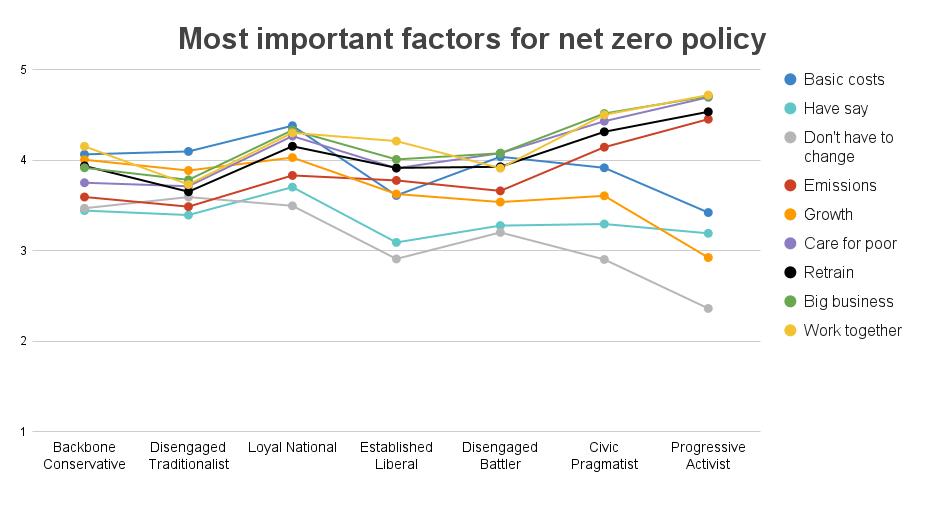
Importance of various factors in the UK’s efforts to reach net zero, by segment, where 1 signifies the lowest importance and 5 signifies the highest importance. Data: Jan 2022.
While the idea of not needing to change their way of life was lowest for most segments, some considered it far more important than others (e.g. Disengaged Traditionalists).This is in line with Disengaged Traditionalists generally being the least open to taking personal environmental actions in their own lives (read more about Disengaged Traditionalists here).
Notably, segments that tend to be more left-leaning (Progressive Activists, Civic Pragmatists) had much more divergent views on what is important for net zero than those who tend to be more right-leaning (Backbone Conservatives, Disengaged Traditionalists). On the left – Progressive Activists and Civic Pragmatists showed clear distinctions between what is very important and what is not important to them. The most important factors were ensuring big businesses face fines and taking care of poor and vulnerable communities. The least important factors were not having to change the way they live and economic growth.
On the political right – Backbone Conservatives, Disengaged Traditionalists and Loyal Nationals were much more likely to cluster their responses together, but were also more likely to prioritise making sure their own basic costs of living do not go up than the left-leaning segments (although notably this was also important to low-income Disengaged Battlers).
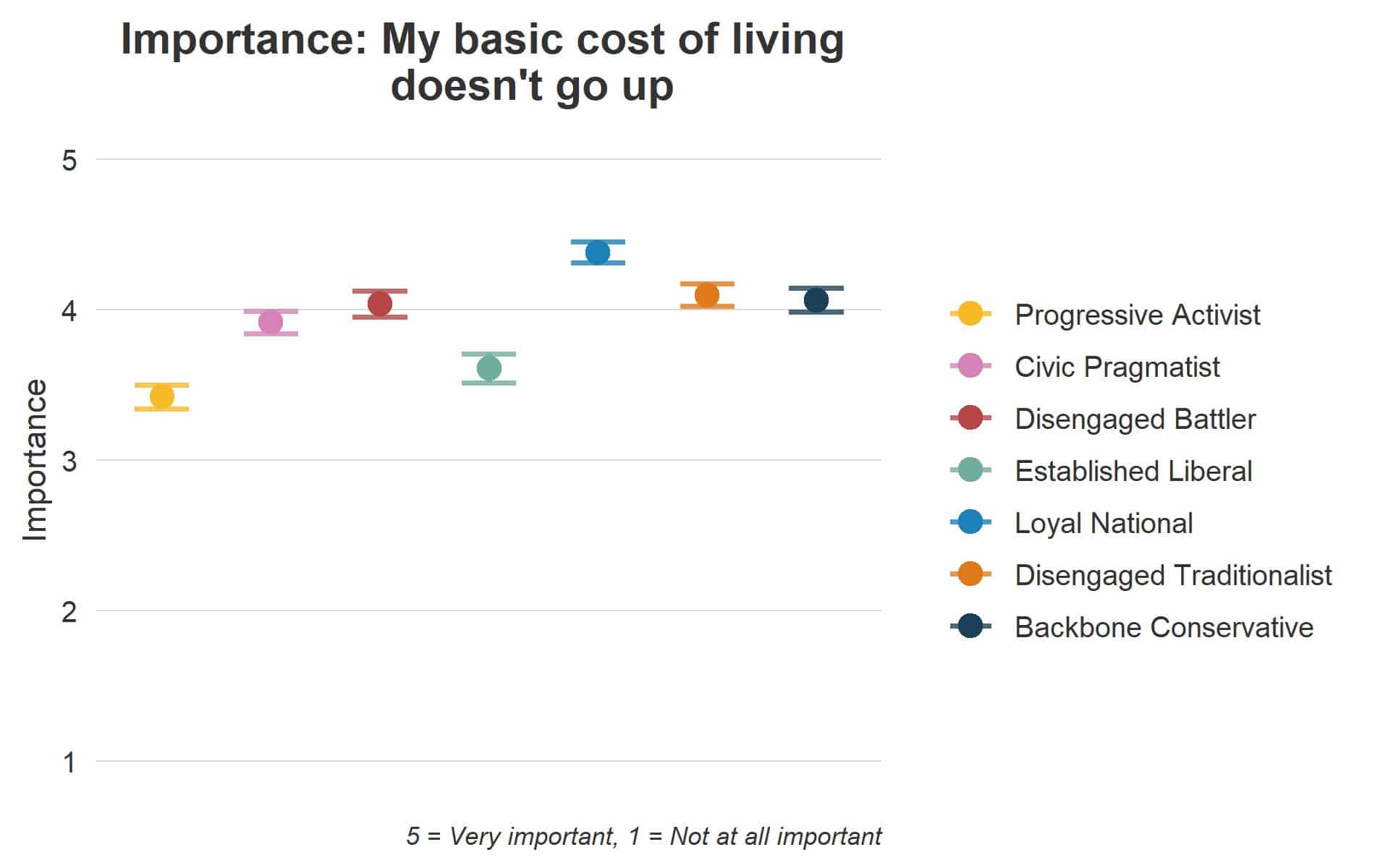
Importance of basic living costs not rising for the UK to reach net zero, by segment. Data: Jan 2022.
Among the four segments we spoke to in focus groups – many doubted whether the 2050 net zero target is still achievable. This failure was put down to either the UK not investing more in green industries sooner, and others finding the target unrealistic or too distant.
Established Liberal: “I think it would have been nice if the government had actually invested in a whole industry that didn’t exist 10 years ago, and become a world leader in it. I mean, that could have been jobs for many people in this country. You know, a lot of exporting for the country. Being able to make a change in this country at probably a much lower cost than importing the technology from other countries. … The manufacturing of things like wind farms, servicing, installation. You know, solar panels.”
Loyal National: “I don’t see how it’s going to happen. I don’t see the benefits. They’ll find something else that’s gone wrong and we’ve got to do something else to change that, and then another target for another 30 years after that. Luckily, I won’t be here to see it.”
Disengaged Traditionalist: “2050 is half a lifetime away. … To say that we’ll achieve that by 2050, it’s not today’s problem, it’s a problem we can sort out in twenty years’ time as opposed to 27 years’ time.”
Disengaged Traditionalist: “At least if everybody put that little bit of effort [in], we might get it [net zero by 2050].”
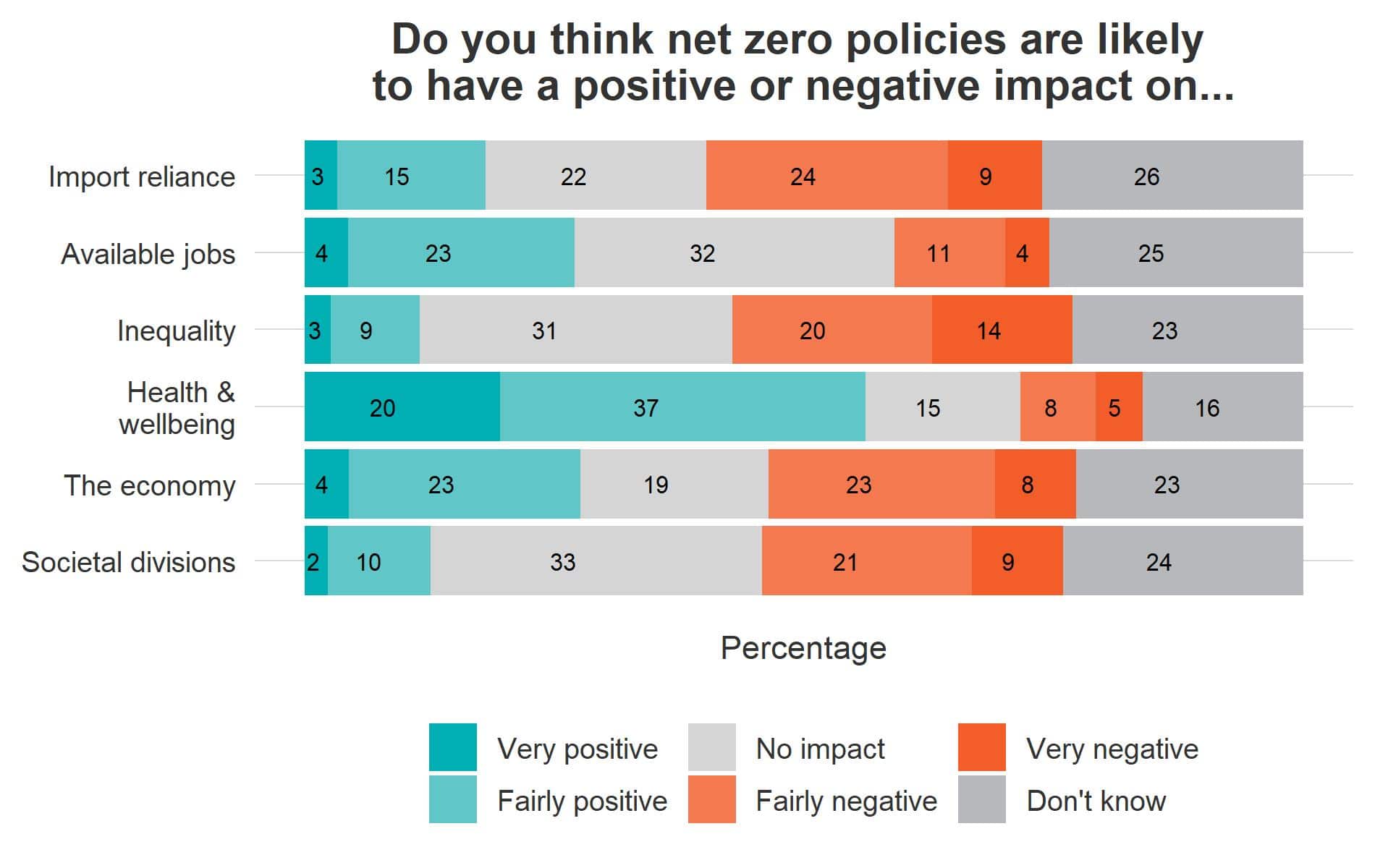
Perceived positive and negative effects of net zero policies on various societal aspects, averaged across all segments. Data: Jan 2022.
Participants also expressed mixed views about whether net zero policies would bring positive or negative impacts to UK society. While net zero was seen as improving our health and wellbeing overall, inequality and societal divisions were expected to be negatively affected – or unaffected – by net zero policies. Overall, segments were also divided about whether the economy and jobs would be positively or negatively affected, with most segments (except Progressive Activists) being undecided. All thought net zero is likely to have a more negative than positive effect on inequality between rich and poor. This concern was pronounced among Civic Pragmatists and Loyal Nationals. The divided views and high number of “no impact” responses may reflect low levels of awareness about net zero, coupled with uncertainty about the exact policies that may be implemented.
Established Liberal: “In theory, there should be some good impacts if they have to design and build and maintain things like wind farms, offshore wind farms and things like that, to get more green energy into the system. But, there could just be more problems if companies are having to buy carbon credits, if it’s just going to be a case of the bigger company just polluting more, and buy back what they need to, to cover what they’ve done. So, they’re not doing anything in a cleaner manner.”
Backbone Conservative: “I don’t know the policies, I don’t understand the policies. So, I can’t really judge them. So, I can’t really judge them, good, bad, or indifferent.”
Loyal National: “I think if we can achieve it, it will benefit us because people, like you said, they might look at us like innovators. That will, I reckon, boost our economy because then we’re making things cheaper, you know, and stuff like that.”
There are some differences in opinion on the likely effects of net zero policies on the economy. Net zero tended to be seen as more negative than positive for the economy by all segments except Progressive Activists and Civic Pragmatists. However, as most segments believe it’s possible to protect the environment and protect the economy at the same time, it may be that net zero is not yet linked to protecting the environment/climate change in the public eye.
Overall, people took a more positive view about the impact of net zero on the availability of good jobs, with almost all saying that net zero is likely to have a positive impact on jobs. Optimism was particularly high for Established Liberals, Civic Pragmatists and Progressive Activists. However, the margin for the rest was slim, with notably less optimism among Disengaged Traditionalists, Loyal Nationals and Disengaged Battlers.
Disengaged Traditionalist: “I’m half and half with that, it might create new jobs but it might destroy other ones, so it’s just depending on which way they will go with this.”
Disengaged Traditionalist: “Well, again, in my local area, wind turbines are being manufactured on the Tyne now, so it’s actually bringing higher paid, quality jobs to the area. It does have that impact, but that’s just a small number of jobs, it’s not creating the thousands of jobs that were around in the past from certain companies.”
Backbone Conservative: “You know, so by going into green, renewable sources, these do not harm the economy, it will create jobs at the same time, will reduce the carbon footprint in this country and it will benefit everybody.”
Backbone Conservative: “So, if it’s done in the right way, there should be more jobs, but that’s key to how the government goes about it because, I think, initially, it’s going to have to fund it in some shape or form and it’s just how that money is managed and it needs to be put the best of use so the government gets value for that money.”
Perceived impact of net zero policies on the availability of jobs, by segment. Data: Jan 2022.The net zero policies that were seen as most expensive for the country are:
-
- shifting industrial processes (e.g. agriculture and manufacturing) away from fossil fuels
- switching from gas boilers to clean heating technologies
- switching from petrol and diesel to electric cars
The net zero policies that were seen as least expensive for the country are:
-
- giving more space to pedestrians and cyclists on the roads
- planting trees and hedgerows to capture carbon
- improving recycling and waste reduction
Notably, Loyal Nationals and Backbone Conservatives were much more likely than other segments to estimate higher costs for the country associated with switching to clean heating technologies and electric vehicles – two areas of focus from opponents of net zero.
Fairness
The views of segments on fairness differed in meaningful ways. There was some disagreement whether “fairness” means every individual or business should play by the same rules when it comes to cutting carbon emissions or whether there should be special rules that apply to those who emit the most carbon emissions.
Progressive Activists were one of the only segments that were strongly in favour of the idea of applying special rules to high emitting businesses and individuals. There was moderate agreement from Civic Pragmatists, Disengaged Battlers and Established Liberals, but these segments were more divided.

General preference for having the same rules or special rules for businesses and individuals in cutting carbon emissions, by segment. Data: Jan 2022.
Among the segments we spoke to – Established Liberals were more likely to favour special rules. For Backbone Conservatives, “fairness” was about making sure that there are no loopholes, and that everyone follows the rules – and the same rules apply to all. Loyal Nationals, who were divided on this question, pointed to examples of elites exploiting the rules for their own benefit. Loyal Nationals also expressed concern that further special rules would only be exploited by the powerful.
Established Liberal: “I think it’s important that ‘one size fits all’ is not an answer, because people are different. People have different needs, and I think … if we tar everyone with the same brush to say, ‘This is what you all need’, then that’s going too much the other way. We have to look at individuals, look at individual communities and minorities and see what the actual unfairness is, for want of a better term, and then look at that rather than just, ‘Here, you have this’ or, ‘Here, you’ll get this’. I think it has to be more in-depth and deeper, to see what is actually unfair and what we can do for particular people and individuals, and communities.“
Backbone Conservative: “It seems to be the people that have claimed benefits … [who] know how to work the system. I think I tried to claim once years ago and I weren’t [sic] even allowed to have anything. But yes, then there’s people who are on benefits for years, and years and years and know exactly how to get more and more. It’s very unfair.”
Disengaged Traditionalist: “[Fairness is] a behaviour, so it is related to everything. It’s about treating everybody the same and giving them the same opportunities.”
There were some differences in what people felt was fair treatment for businesses compared to what was fair treatment for individuals. Overall, there was support for punitive measures to curb the emissions of big businesses. However, participants were more hesitant to apply the same measures to high emitting individuals, fearing that people like them might be affected by unfair implementation.
Backbone Conservative: “I think [businesses] should be named and shamed to be honest. All these companies issue reports and annual reports and stuff, they should be explaining in there what number in this ranking, and how polluting they are, because people will act with their feet I think, or it will encourage them to be more, kind of, considerate to what they’re doing to the planet.”
Established Liberal: “The companies need reining in, let’s put it that way.”
Loyal National: “You know, [those businesses have] made billions of pounds, dollars, however you want to measure it over the years in the industry that they’ve been working in and if they’ve contributed so much to the environment worsening. … If they’re causing it, or they’re causing the majority of it, then surely they have more of a moral responsibility to try to correct that as well.”
Disengaged Traditionalist: “If the people who create the most carbon have to pay for it, how can that be policed?”
Loyal National: “I think if you own a private jet, then I think at that level, it has to be relative, doesn’t it? It really does. We already pay more council tax, for example, on a larger property. So, I think, you know, Joe Bloggs is being penalised and battered enough as it is. I don’t agree with that. It just sounds so wrong. You’ve had two holidays this year, you’re penalised for it now, no. I don’t like that.”
Fairness scenarios
Participants’ judgments of fairness leaned more towards “special rules” when specific scenarios were presented. We provided four examples of households on high, medium, low or very low incomes and emissions profiles, and asked whether particular policies would be seen as fair or unfair when applied to each. When given specific scenarios, most segments changed what they had said was fair or unfair, depending on the income of the household in question.
In general, segments thought it is unfair for lower income households to pay more tax to help the UK reach net zero. This view was particularly strong for Progressive Activists, Civic Pragmatists and Loyal Nationals.
People also thought it unfair for high-income households to receive government grants or tax benefits for environmental changes to their homes. This was particularly the case for the on average lower income segments (Disengaged Battlers, Disengaged Traditionalists and Loyal Nationals).
However, on average Disengaged Traditionalists thought that most measures were unfair, for all households. They felt it was unfair for high-income households to receive a government grant, yet they also did not feel it fair for very low-income households to receive the grant.
Procedural fairness
Our research suggests that public consultation on net zero is crucial, particularly given low levels of political trust. Despite the government winning the 2019 election with “reaching net zero by 2050” as a key policy in the Conservative Party’s manifesto, this is not seen by people as a political mandate to proceed without consultation. In fact, many express a lack of trust in what is said before elections and what is done after (read more about trust).
Established Liberal: “I really think there needs to be more consultation, in as far as policies sound great but I think the government need to realise how things are on the ground.”
Backbone Conservative: “There’s not one I’d follow across the road, or go anywhere else. They don’t give you any confidence and they turn out so often, that they get caught in a lie.”
Loyal National: “The problem with politicians is, when it comes to elections, they all promise everything and then they’ll do the opposite or they just won’t deliver on it. So, what they’d have to do is actually say something and deliver, rather than just make those empty promises.”
Disengaged Traditionalist: “Also, I think it’s all these broken promises from every single party, I can’t even see how the Greens would do it, if I were to vote for them.”
Only a very slim majority of all segments agreed that the government should just get on with achieving net zero without further public consultation. Disengaged Traditionalists and Loyal Nationals in particular felt that the government should not take any action to deliver net zero without first consulting the public. This shows that the social mandate for net zero needs constantly updating and reinforcing.
Transport and home energy policies
Support for net zero policies varied by segment, with the majority in each segment being in favour of measures such as higher vehicle taxes for large cars, low traffic neighbourhoods and a flight tax after the second or third return flight per year.
For vehicle taxes, people were most likely to say that drivers of large or heavy vehicles should pay more motorist taxes. Only the two disengaged segments answered differently, judging that no single type of vehicle should pay higher than average taxes. While many also indicated that old and inefficient vehicles should pay more taxes, some were concerned about how such choices would interact with income.
Loyal National: “If you’re determined to cut to zero, it [tying road tax to vehicle pollution] seems fair, but in the real world where you can’t afford anything but an older vehicle, no, of course it’s not fair.”
Overall, the majority of people in all segments thought drivers of electric cars and those who live in rural areas should pay below average tax. Most were unaware that electric vehicles pay zero road tax, with mixed views about whether it would be fair or not.
Backbone Conservative: “Yes, I think that’s [EVs paying no road tax] fair.”
Backbone Conservative: “I don’t think it’s fair. I think everybody should pay road tax. I own an electric car, I’ve had one for nine years so I’m using the road, wearing the road down, pollution from the tyres. So, electric cars should maybe pay £50 and a petrol [car] maybe pay £150, or pro rata, but everybody should pay something because I’m still using the road. Otherwise, if I don’t pay, your petrol car is going to pay double.”
Established Liberal: “If they make more emissions, then they should pay more to have those emissions neutralised and also the amount of wear and tear on the roads should be taken into account when deciding on a level of tax.”
Established Liberal: “I’ve just changed from a diesel for exactly the reason that I wanted to be kinder to the environment. Bought a hybrid and my car tax has gone up by £120 a year, whereas it should be going the other way, shouldn’t it? There is no incentive to go hybrid or electric, I don’t know about electric but there is definitely no incentive to go hybrid.”
Regarding road policies, people generally felt it was more important that their local neighbourhood should be less polluted and less congested rather than open to drivers at all times. While all segments largely preferred low traffic neighbourhoods, this margin was smaller for Disengaged Traditionalists.
A significant minority of all segments tended not to fly at all in an average year, and the majority flew once or twice. Established Liberals were most likely to take flights.
A majority were willing to pay a flight tax after their second or third flight, with highest support from Progressive Activists, Civic Pragmatists and Established Liberals. Notably, Established Liberals were both most likely to fly out of all the segments and also third most willing to pay for a flight tax, perhaps indicating a willingness to pay more in order to maintain their way of life.
Backbone Conservative: “When you were saying about flying before, I don’t think people that fly, sort of, a handful of times a year should be penalised, but people that can afford to take the private jet here, there and everywhere just because they’ve got the money, then they should pay a higher price.”
Established Liberal: ‘Taking flights, if somebody’s going on holiday six times a year, then there’s no excuse for that. If somebody needs to get from A to B quickly because of something vital to help the world, then you can justify it. And I think they need to look at the reasons, and try and reduce air travel. I love air travel, but I won’t do it these days because it’s just not right. And another me just saying, ‘No, it’s my principles that I’m not going to fly anymore,’ I’m not going to do a lot of good on me. But, if enough people look at it and feel the way I do, then it could make a difference.”
Established Liberal: “I enjoy travel, it’s a great passion of mine. I take all sorts of other steps to try to do my part as far as sustainability and climate change is concerned. I’m aware I could do more and it’s for me to keep persevering with that but I love travel and obviously it does play a big part in climate change but I’m also lucky enough to be in a position where my husband and I could pay additional taxes and charges.”
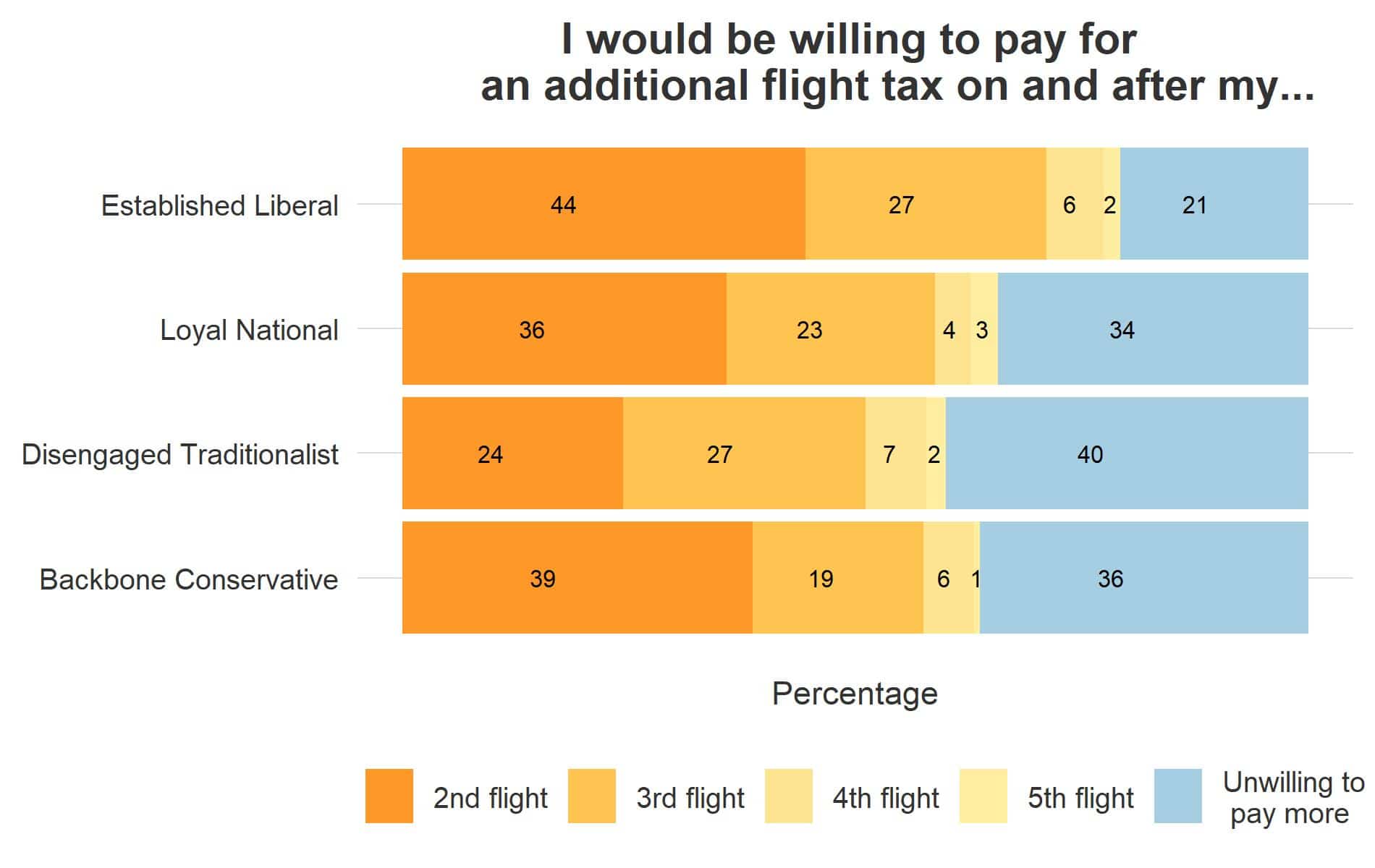
Willingness to pay an additional flight tax on or after a certain number of return flights per year, by segment. Data: Jan 2022.
Many were unwilling to pay an additional tax at all. A significant minority (32%-40%) of Disengaged Traditionalists, Backbone Conservatives, Loyal Nationals and Disengaged Battlers said they were unwilling to pay any additional flight tax, even though such policies are unlikely to affect them personally. The hesitation stemmed from concerns about risking higher costs, for instance in exceptional and taxing family circumstances that require more flying. Some also expressed doubt about how such a policy might be policed fairly.
Loyal National: “I’d be really angry [to pay additional tax on my second flight], and I already pay more because of the holidays, so you’re paying more over the school holidays. I wouldn’t be happy with that at all. When I get my private jet I’ll pay it then, but no.”
Disengaged Traditionalist: “I think it can’t be the same rule for everyone because, for example, if you do have family, you can have an emergency to see an ill family member, you might have to go three or four times in that year. It’s going to be too much to assess individual needs as and when required. I do understand that if you can afford your luxury holidays, if you do literally just want to go on three or four holidays a year, yes, be prepared to pay.”
Backbone Conservative: “So, I don’t really fly much, however, I think it probably depends on what the amount is. … The worry is flying will be left to the people who can afford it and those people that can’t, they may have something going on in their personal life and they need to get away for that second time in the year, it might not be a regular occurrence, it might just be a one off, they’ve got to go to an emergency or something. So, I think I’m, kind of, for it but I think … it has to be … judged case by case.”
In relation to home energy options, there were signs of a growing awareness of heat pumps. However, around 15%-20% of respondents indicated that they had not heard about heat pumps at all, and the majority of participants judged themselves as unlikely to install one.

Stated likelihood of switching from a gas boiler to a heat pump in the next five years, by segment. Data: Jan 2022.
For those who would consider a heat pump (around 13%), the top reasons were environmental:
-
- they emit fewer greenhouse gases than gas boilers (63%)
- they are more energy efficient than gas boilers (53%)
- they are better for air quality (35%)
For those who would not consider a heat pump (around 44%), the top reasons tended to be cost-related:
-
- they are more expensive than gas boilers to buy (50%)
- they would require too many other changes to my home (32%)
- they wouldn’t work for my home (23%)
Beyond the cost argument, views differed widely within segments on whether they would consider a heat pump. In each segment, between 14% and 37% of respondents selected the “other” option, indicating that it might be worth exploring this question further.
Established Liberal: “One of the things that’s very, very much in my mind at the moment are air source heat pumps, because I would like one. Because they’re green and they’re a cheaper way of heating, and a more reliable way of heating. And they cost the earth. Now, you take one apart and count up the amount of aluminium, copper, wire, bits and bobs. There’s no way that you can come to the cost they charge you for one bill.”
Loyal National: “Over £10,000 to upgrade my boiler [to a heat pump] and I just said – and the solar panels, £15,000. I can’t afford that, unless the government is going to give grants to pay for the cost of installation.”
Loyal National: “Well, we were always told in the past to go for gas because it was a cleaner, more efficient and cheaper alternative. That’s what it was advertised as, natural gas. Now it seems to be doing a turnaround where it’s getting very expensive and they want you to get rid of your gas boilers.”
Disengaged Traditionalist: “I know they [heat pumps] exist, but that’s about it.”
Backbone Conservative: “We bought the house with an air source heat pump which is very economical to run and my husband’s spent a retirement lump sum on electric cars. So, I feel we’re doing as much as we can for the environment really.”
Read more about net zero and fairness on the updated pages for Established Liberals, Loyal Nationals, Disengaged Traditionalists and Backbone Conservatives.
Continue exploring
Sign up to our newsletter
Thank you for signing up to our newsletter
You should receive a welcome email shortly.
If you do not receive it, please check your spam folder, and mark as 'Not Spam' so our future newsletters go straight to your inbox.

